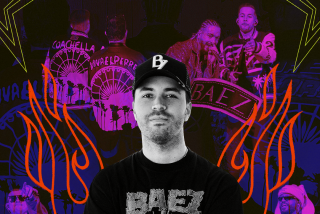South Africa sneaker maker laces up for a hard run at success
JOHANNESBURG, South Africa — For a Soweto boy, he had a lot of sneakers.
He remembers the joy of that first pair. They had to be red. Walking out of the shop carrying a cardboard box with the sneakers, Sifiso Dlamini, at 12, took the first steps on a long journey in search of the soul of a shoe.
“Having a pair of sneakers in Soweto meant a lot. You were cool and every kid on the block wanted to have their pair of sneakers.
“I had a lot, because I was obsessed” — a dozen pairs, more than anyone he knew in the township.
His mother wanted him to finish school and be an accountant, but he dropped out. “My passion was making sneakers,” he said.
In 2008, he started his own brand of handcrafted sneakers, Eish Hade (pronounced eyesh hah-day). Through social networking, his sneakers have found a niche, with orders mounting into the hundreds.
But with just one industrial sewing machine, he and his partner, Nkululeko Ndlovu, can make only about five pairs each in a week.
Small township businesses are a crucial part of South Africa’s economy, a potential driver to expand the country’s small but powerful middle class. But 440,000 small-business start-ups have collapsed in five years, according to employment consulting firm Adcorp. Many fail because the owners lack education and business planning skills and don’t have access to bank loans or other capital, analysts say.
That’s a significant problem in a country where the unemployment rate is sky-high and small businesses such as Dlamini’s with fewer than five employees account for 43% of jobs.
Dlamini and his partner work out of a chilly concrete room near Alexandra township, in a space donated by South African marketing businesswoman Michelle Combrink, who took a shine to their can-do attitude. They pay themselves less than $130 a month, have one trainee and pour all their earnings back into the business.
But they need more capital, to get training on how to make better shoes and the $15,000 machines Dlamini says will expand the tiny enterprise.
Dlamini, an elfin figure who lights up when talking about sneakers, uses rescued leather from old jackets and even pieces of stressed upholstery from abandoned furniture. The sneakers, with high tops and panels of inlaid vintage leather or fabric, sell for about $35.
As a child, Dlamini spent his spare time drawing sneakers, inspired by the hip-hop artists he worshiped. On weekends, he sold triangular pies called samoosas, using the profit to buy more sneakers for his collection.
“I wanted to feel special, having a pair of sneakers that no one else had,” he said.
So when he was 19, he took an old pair of sneakers, pulled away the upper part stitch by stitch, as carefully as a surgeon, revealing a naked-looking sole. He laid out the skins of his sneakers like patterns onto pieces of a used burlap sack, cut them out laboriously and sewed them into his first pair of shoes.
“For my first time, it wasn’t that bad,” he said. “I was happy because the shape of the shoes really made me inspired to keep on going and improving it.
“The fact that I made them from scratch inspired a lot of people. I had lots of people come to ask about them.”
He came up with his brand, Eish Hade. (If you stepped on someone’s sneaker in Soweto, you’d probably say, “Eish hade,” township slang roughly meaning, “Oops, sorry.”)
“We want to have our own shop, just a small shop in town in Johannesburg,” he said. “But we don’t have the finance to start a shop now.”
He and his partner tried to get bank loans.
“It’s complicated. They want pay slips. We have our own business. We don’t have pay slips,” Dlamini said.
Their Facebook page created a surge of orders they cannot fill.
“The demand is too high. We are getting orders from outside the country, from Kenya and Namibia,” Dlamini said.
Getting training, accessing capital and scaling up to meet demand are difficulties that doom many small township businesses, said Shaun Govender, director of the Business Place, a nonprofit that offers advice and help to small entrepreneurs such as Dlamini.
“We have a very low literacy rate in South Africa and a very low skills level,” Govender said. “This is one of the reasons why businesses are failing in South Africa.”
Govender said South Africa doesn’t provide a business-friendly environment to nurture small start-ups, a criticism made by other analysts.
“Our policies are not geared toward helping small businesses,” he said. “If you look at our tax system, you have small businesses struggling to pay the same [percentage of] taxes as big business.
“The banking system is very risk-averse. The bank wants 100% surety, and if you are a poor small black business, where do you get 100%?”
Combrink, a former teacher, said many young South Africans lacked access to mentorship and development.
“Many people go belly up because they lose control of their finances,” she said. “You have to sacrifice everything to the business when you start your business.”
A year go, she met Dlamini and Ndlovu at a hip-hop festival, where they were trying to sell their shoes.
“They were working from home in Soweto,” she said. “It was literally working from his bedroom making sneakers on top of his bed.”
Dlamini is determined not to add his name to the 440,000 small-business failures.
“In 10 years’ time, I’ll have 1,000 people working for me,” he said. “We’ll have a big factory. And shops all around the world.”
More to Read
Start your day right
Sign up for Essential California for news, features and recommendations from the L.A. Times and beyond in your inbox six days a week.
You may occasionally receive promotional content from the Los Angeles Times.






